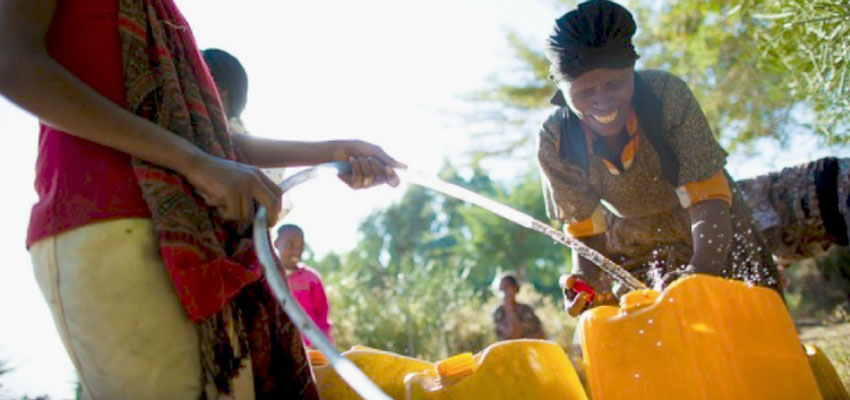
Seeking six design facilitators for a WASH themed co-design summit in Ethiopia this January co-hosted by PSI/Ethiopia and MIT-D-Lab. Applications due by Wednesday October 11 at noon EDT. Apply online here by October 11!
The Context
Africa’s oldest independent country, Ethiopia is known as the source of coffee and mankind. With one of the fastest growing economies in sub-Saharan Africa, Ethiopia still faces challenges as health markets are failing to reach those that need life-saving health products and services, especially in the WASH sector. Ethiopia achieved its Millennium Development Goal target of 57 percent access to safe drinking water, halving the number of people without access to safe water since 1990. Yet access to improved sanitation remains stubbornly low at only 28 percent nationwide up from three percent in 1990. Despite these strides, safe water, sanitation and hygiene (WASH) coverage remains insufficient. Inadequate access to safe water and sanitation services and poor hygiene practices negatively impact health and nutrition; diarrheal disease is one of the leading causes of under-five mortality in Ethiopia.
To address a part of this grand WASH challenge in Ethiopia, PSI/Ethiopia launched a market development project in 2017 to increase use of improved water and sanitation products. The USAID-funded Transform WASH program addresses key barriers to uptake and sustain use of WASH products and services. It is achieving this by strengthening demand for WASH products and services, especially sanitation, by designing communications, products and services that meet consumer needs. It also influences the WASH supply chain by providing evidence on tested concepts and solutions for products and services that result in a strengthened value chain and the adoption of profitable business models for WASH (including toilets, hand washing, water storage, water treatment, and fecal sludge management), that reach low-income consumers. In addition, the program is strengthening the enabling environment through co-creation, collaboration, and co-learning with the Government of Ethiopia, private sector, consumers, financial institutions, and development partners to remove barriers to a thriving WASH marketplace and to improve client-oriented behavior.
The WASH Co-Design Summit
As a part of the larger Transform WASH program, PSI/Ethiopia is partnering with MIT D-Lab to host a 10-day WASH themed Co-Design Summit from January 22-Feburary 2, 2018 to catalyze connections and solutions to common WASH challenges. The summit will convene 30 participants – 24 Ethiopian participants from across the WASH sector (users, health workers, government representatives, local entrepreneurs, and WASH experts) and six MIT D-Lab students – to practice the co-creative design process and prototype low-cost solutions together.
During the summit, participants will live and work with each other around Hawassa, Ethiopia. They will participate in hands-on learning sessions led by PSI/Ethiopia and MIT D-Lab as well will work in one of six project teams. The projects will focus on one of the following topics*:
- Improving water accessibility for cleaning and washing
- Understanding gender difference in how toilets are used or not used
- Creating products for segmented markets (children, elders, women, disabled, etc.)
- Designing interactive educational tools (for kids, for HEWs, for entrepreneurs, etc.)
- Improving smell and cleanliness of toilets and latrines
- Creating solutions to handwashing challenges
- Making products more transportable
- Improving modularized units of products (for selling and distributing)
- Improving affordability of toilets through material substitutions
- Improving superstructure and toilet design
- Designing toilet paper alternatives
*All projects are subject to pivot based on information gathered both before the summit and during the summit.
The Design Facilitator Role
The Design Facilitator will play a critical role in leading and supporting each project team through the co-design process (there will be one design facilitator per project team) and creating a simple project brief after the summit. The design facilitator will instruct or co-instruct some sessions for the hands-on sessions (including build-its sessions).
Before the summit, the design facilitator will be required to attend a series of online calls to train together and prepare for the summit, read background documents about the context, and watch a few key videos on the work of PSI in Ethiopia so far.
During the summit, the design facilitator will help guide each project team through the design process and support any physical or mental needs the team may have. Design facilitators will not be responsible to create a solution, but they will responsible to help keep the team unified and ensure they co-create a solution together.
After the summit, the design facilitator will create a one-page project brief that includes a summary of the team’s journey, key insights gathered on the project topic, and recommendations for next steps.
Eligibility Criteria
All design facilitator applicants must:
- Be available
- Be at least 18 years of age
- Have experience facilitating a diverse group of people
- Have experience working or volunteering in the WASH sector
- Have practical and basic building skills
- Be respectful, optimistic, curious, and promote inclusive collaboration
- Work well independently as well as in teams
Selection Criteria
We will review all applications and select design facilitators based on:
- Facilitation experience
- WASH sector experience
- Experience in development setting
- Experience and enthusiasm for co-creating solutions through participatory design
- Alignment of personal mindsets with design summit mindsets (respect, optimism, curiosity, and inclusive collaboration)
Experience as an IDDS design facilitator or previous work in Ethiopia is preferred, but not a requirement.
Notification Process
All applications will be reviewed and will be selected by the MIT D-Lab co-lead instructors for the summit, Libby Hsu and Sher Vogel. All applicants will be notified if they are accepted, wait-listed, or not accepted by Wednesday, October 18.
Compensation
Pending funding approval in late October, PSI/Ethiopia and MIT D-Lab will cover the costs of design facilitator round-trip flight, housing, and food during the design summit. In addition, each facilitator will receive a stipend of 2000 USD after submitting project briefs.
Further Questions? Feel free to contact MIT D-Lab Trainings and Convenings Manager, Sher Vogel.

